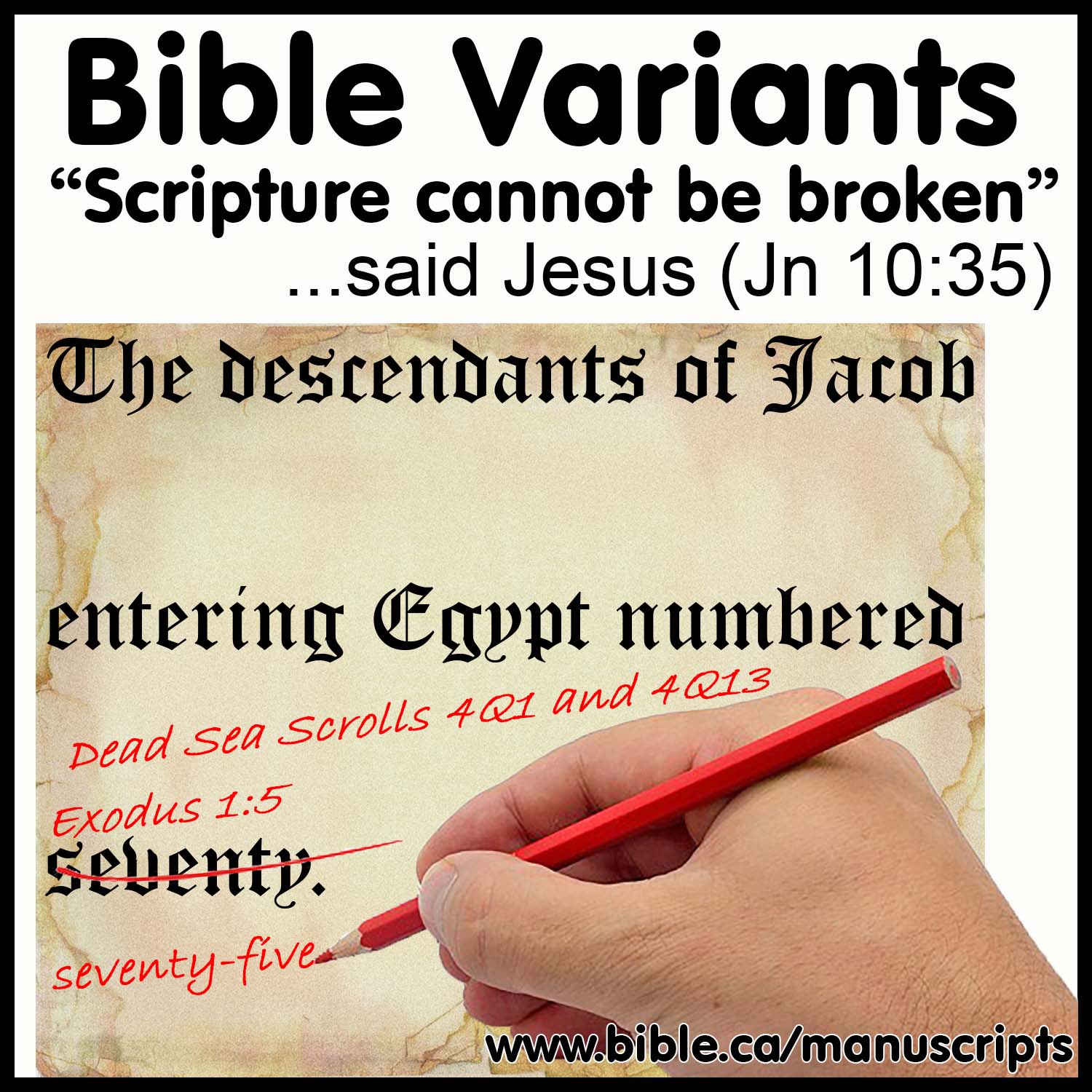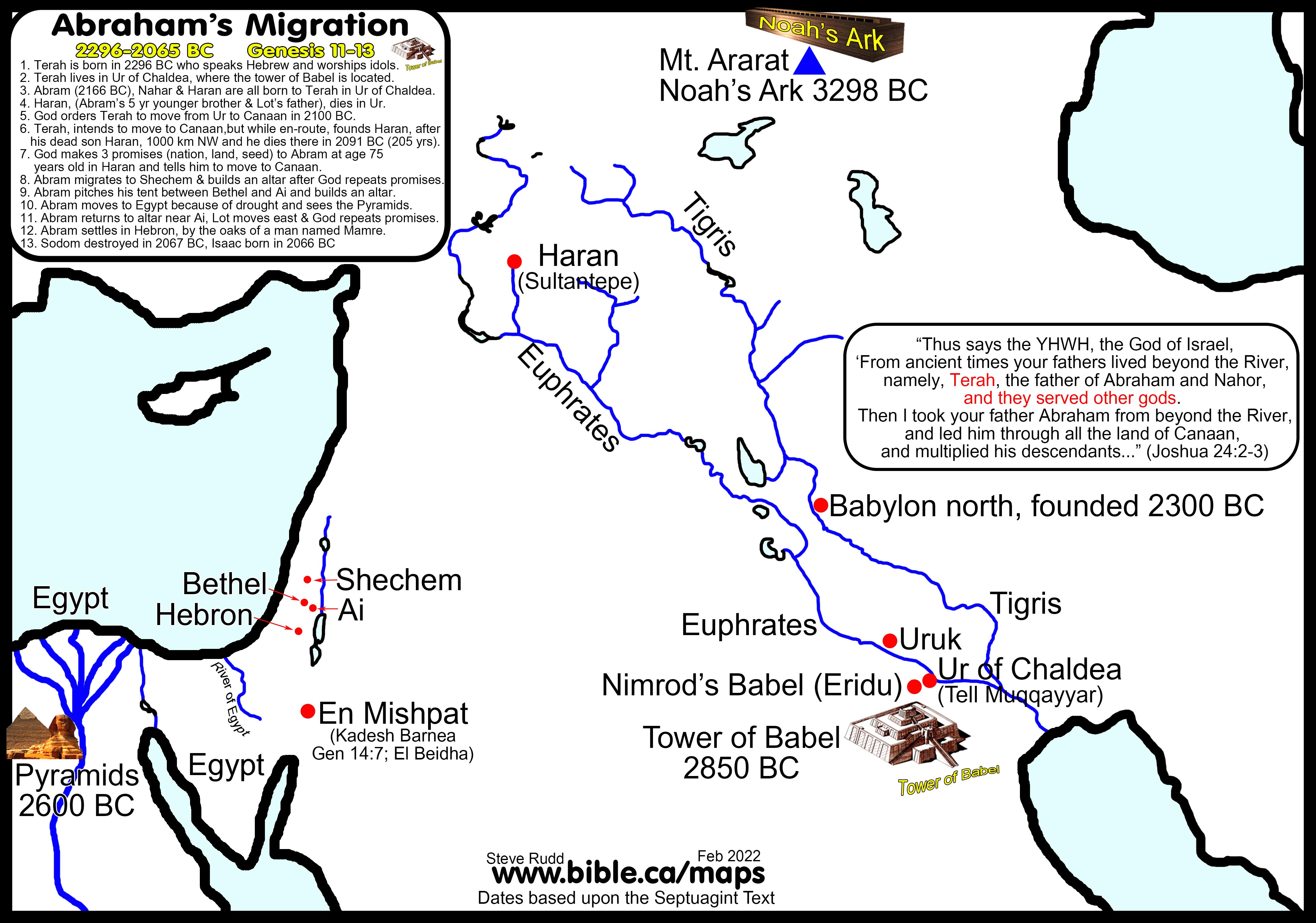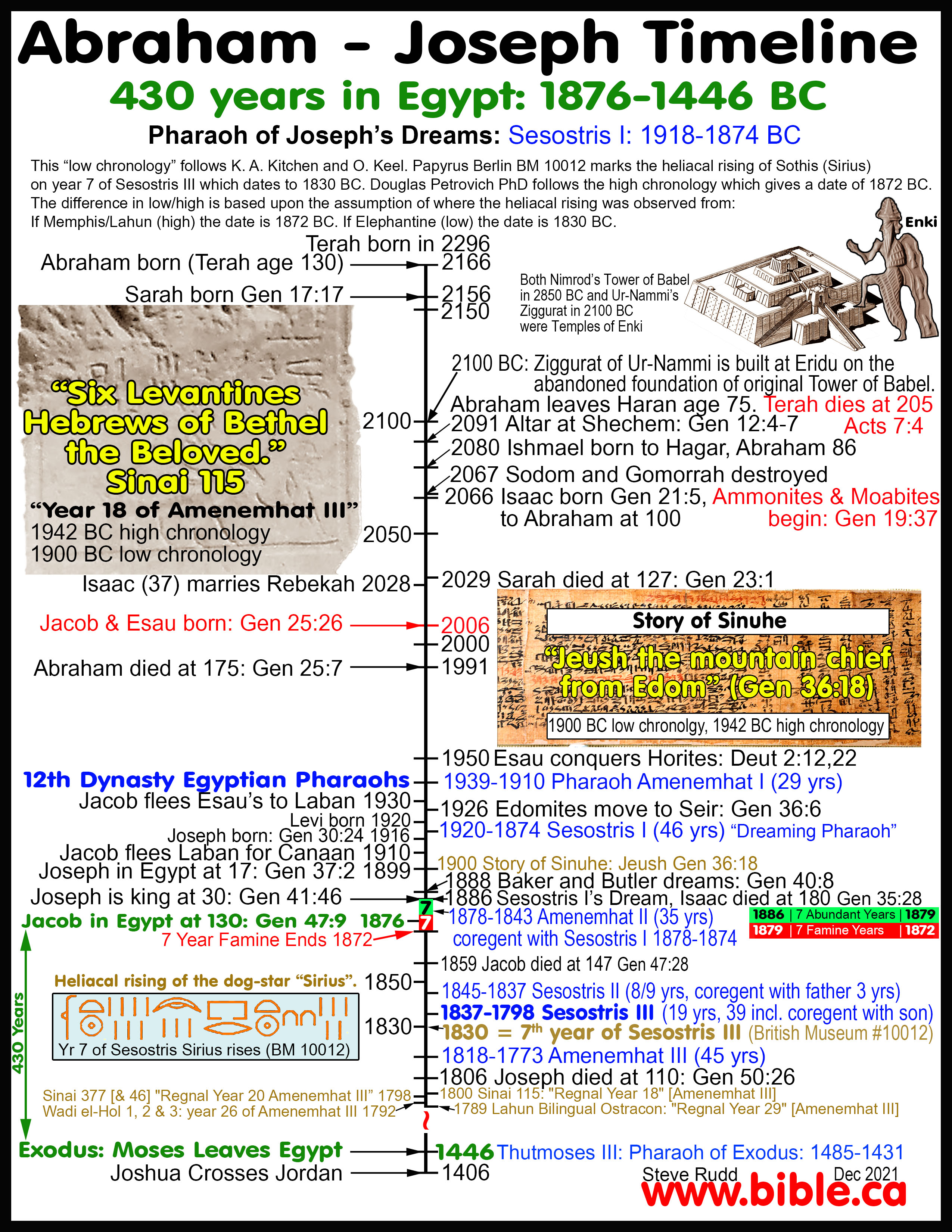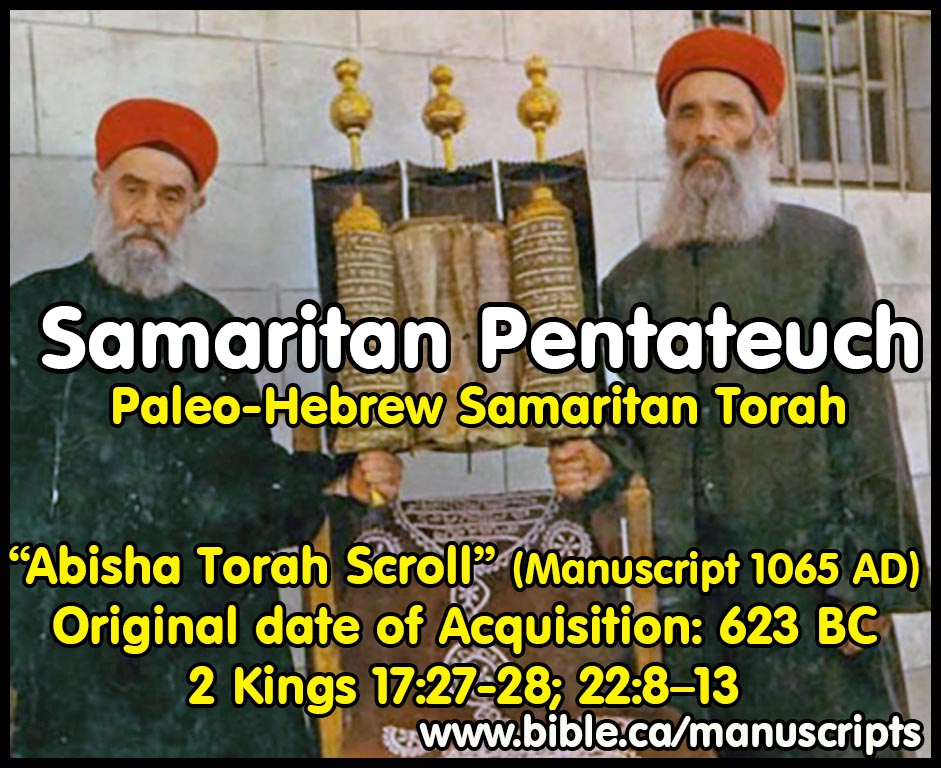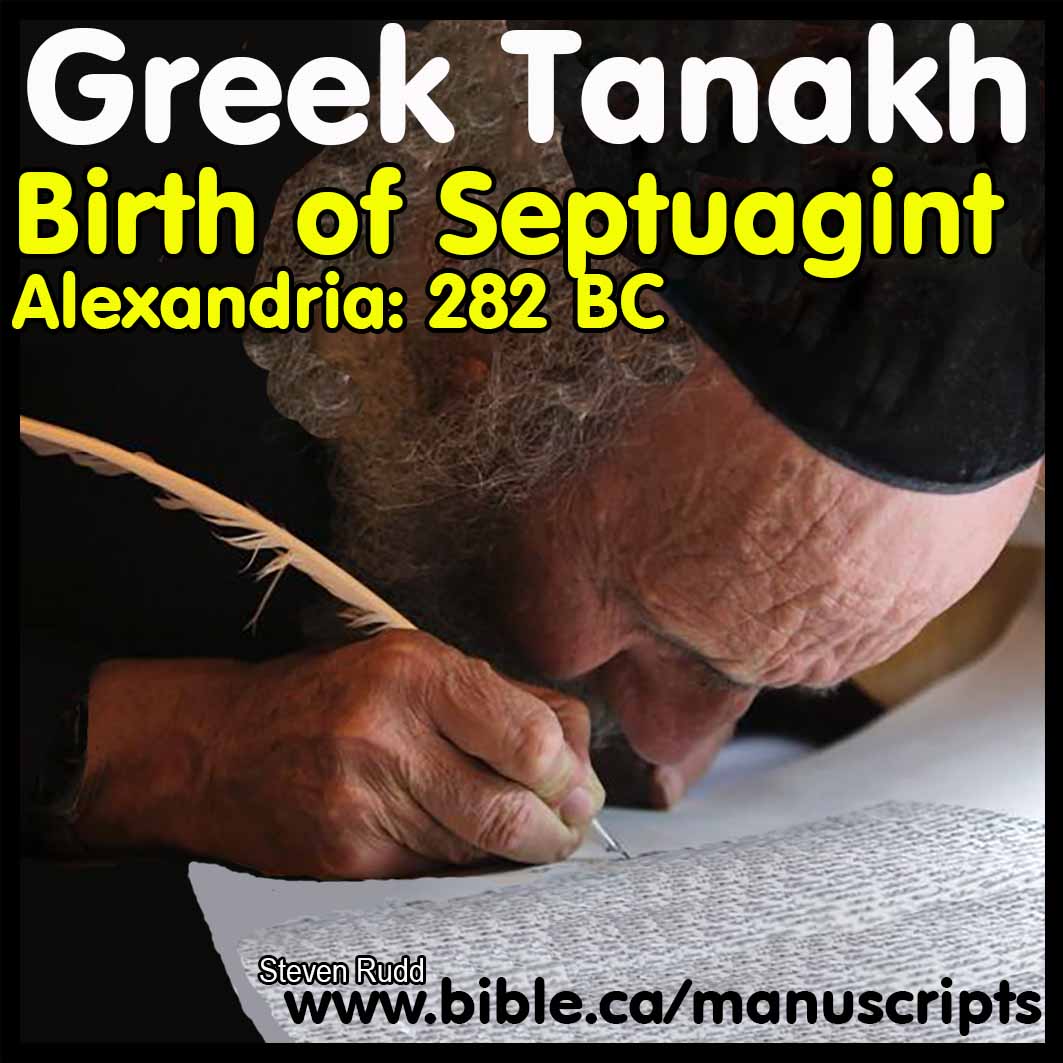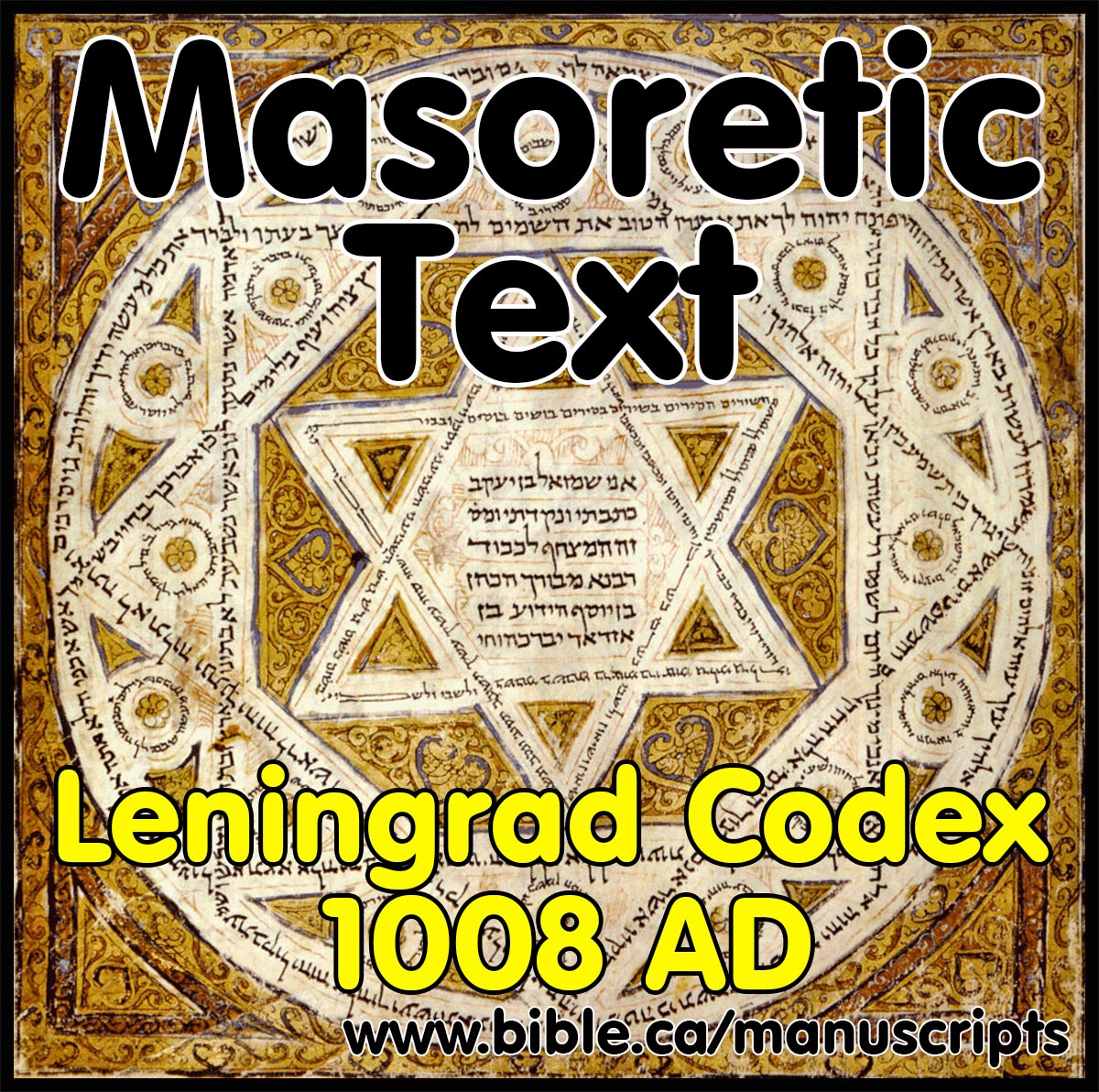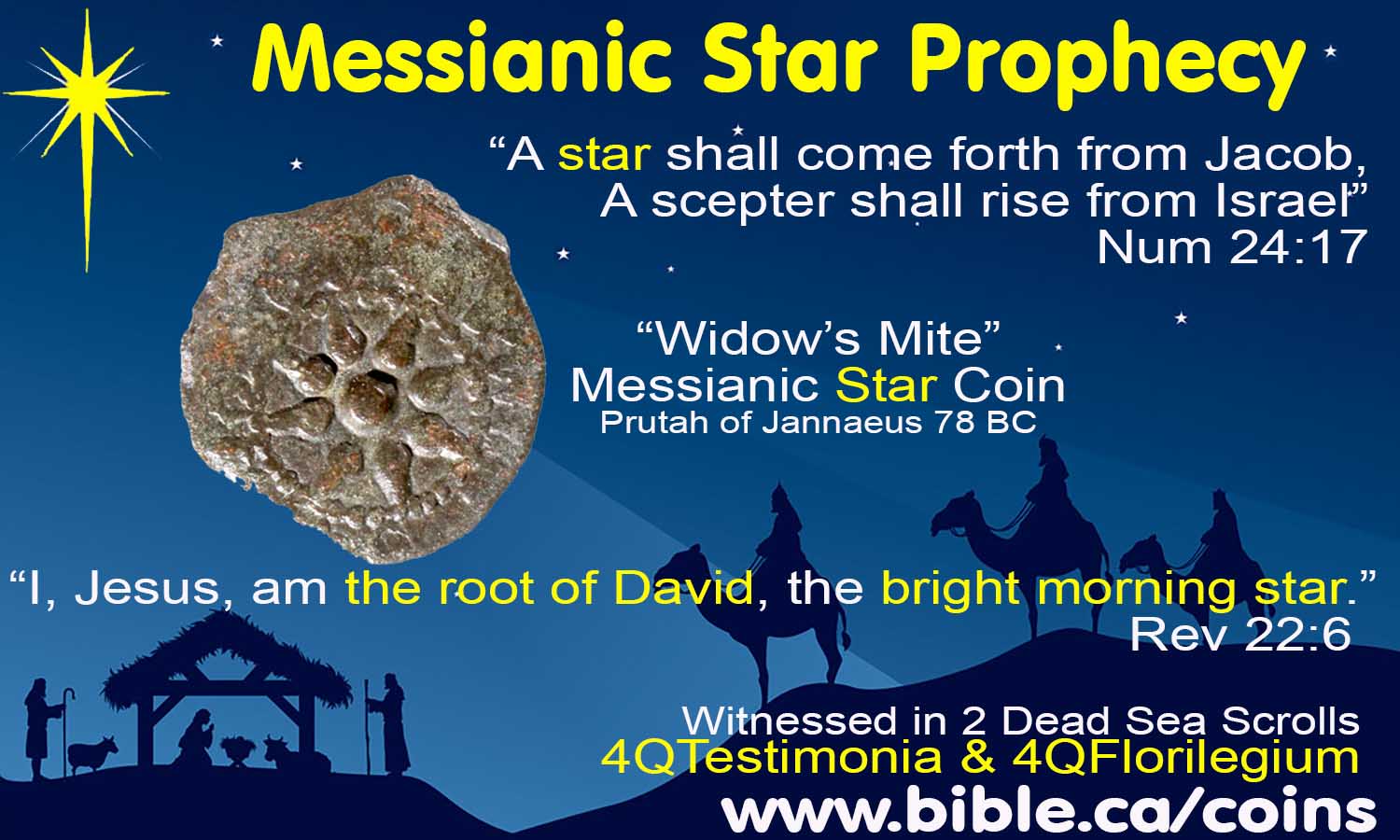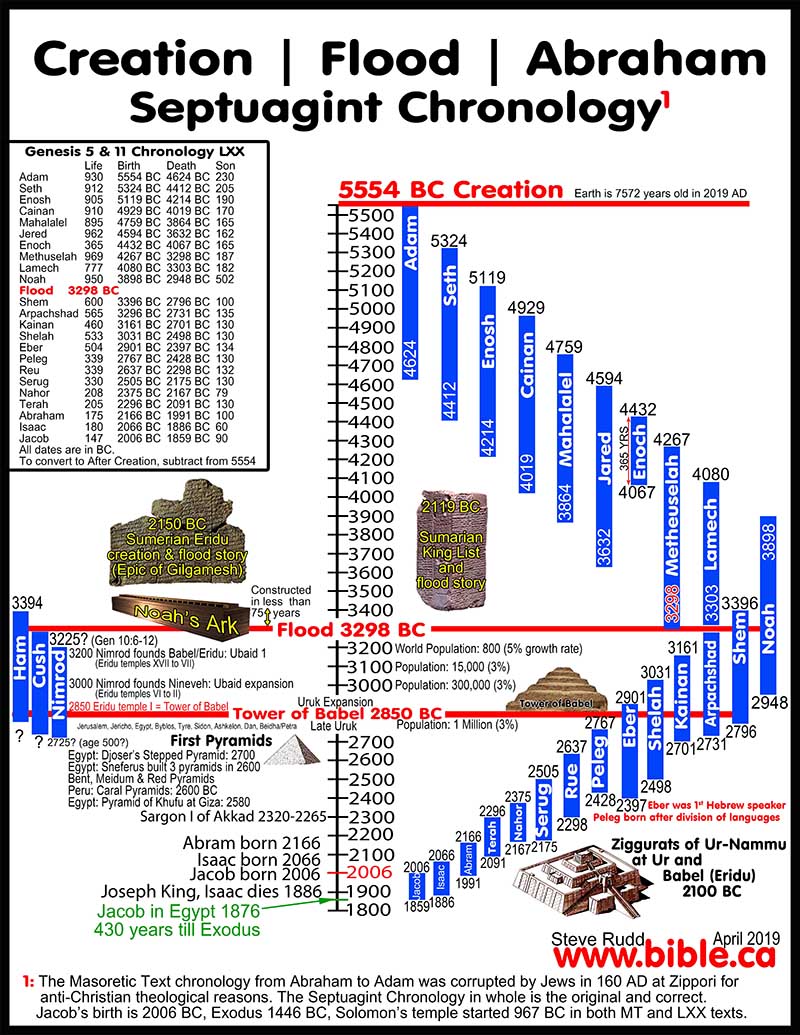|
Terah’s begetting age of Abraham was 130 Abraham was the youngest of three brothers not the oldest! (Terah was 130 not 70 years old when Abraham was born) Chronological Interpretation Variants in the Bible "Scripture cannot be broken" (Jesus, John 10:35) "My word will accomplish what I desire and succeed in the purpose for which I sent it." (Isa 55:11) Steve Rudd November 2017 |
Terah’s begetting age of Abram: Terah was 130 not 70 years old when Abraham was born
Abraham was the youngest of three brothers not the oldest!
Chronological Interpretation Variants in the Book of Genesis
Bible textual variants analysed
Introduction:
The theological variant interpretation about the age of Terah when Abraham was born makes a 60 year difference in the age of the earth. Terah was 130 years old not 70 when Abraham was born. Because of a sloppy reading of Genesis 11:26, most people wrongly believe that Terah was 70 when Abraham was born. Historically, the Jews living from 300 BC down to 70 AD generally all misinterpreted the age to be 70 years old. In spite of Acts 7:4, several ancient Christian sources also got it wrong. Presently among modern Rabbinical Jews, it is universally believed that his age was 70. Since Abraham left Haran at 75, that would mean that Terah lived another 60 years afterwards. In fact, Abraham left Haran the same year his father died at age 205, when Abraham was 75 proving Terah was 130 years old when Abraham was born. The variant reading in Gen 11:32 is suggested as a way to get Terah to be alive after Abraham left Haran because of a supposed misreading of Gen 11:26. While the gloss may have been added by the LXX translators in 282 BC to resolve this problem, both texts can be read to mean that Terah, a resident of Haran at the time of his death, lived 205 years and died in Haran. The Samaritans simply changed the text of the Samaritan Pentateuch (SP) at Genesis 11:32 to shorten Terah’s life to 145 years thereby resolving the problem in their own mind. Today, we know Terah lived 205 years and begat Abraham at age 130. There never was a problem and it is always better to obey God in not changing the text of the Bible because your change you think correct a previous scribal error CREATES A SCRIBAL VARIANT forever confusing generations to come.
Discussion:
I. The proper calculation of Terah’s age of 130 when Abraham was born:
1. "Terah lived seventy years, and became the father of Abram, Nahor and Haran." (Genesis 11:26)
a. Terah did not have triplets.
b. Notice it says all three brothers were born in the same year, indicating the need to uses wisdom and deduction to solve the actual birth order.
2. Abraham is NOT firstborn even though he is listed first in Gen 11:26:
a. Herein lies the fatal assumption made by many in the past.
b. Abraham is first because he is in the bloodline of Christ not because he was firstborn.
c. There is a pattern in the Bible of listing second born son first in a list because they are in the blood line of Christ.
d. “The birth order is not given in Genesis 5:32 (Shem, Ham, Japheth). Shem is listed first because he is in the Messianic line. The same goes for Abraham in Gen 11:26, who was not born when Terah was 70, but 130. This repetition creates a literary inclusio between 5:32 and 11:26 in the primeval history. Moses is making a theological point in both verses, while also giving a chronological referent. The son who was born in the 500th year of Noah’s life is Japheth. Shem is born when Noah is 502, and Ham is the youngest (the superlative translation of “youngest” in 9:24, הַקָּטָ, is almost certainly correct). In Gen 11:26, the genitive τοῦ μείζονος makes Japheth the elder brother of Shem. This is also the Masoretes’ understanding of the Hebrew, as the accentuation shows.” (Henry Smith, Oct. 2017)
|
THE STOLEN BLESSING: Jacob and Esau The theme of the rejected blessing of the firstborn given to the second-born Read outline
Ten people who had their blessing stolen: Able, Shem, Abram, Isaac, Jacob, Joseph, Perez, Rachel, Shimri, Christians |
3. The New Testament tells us that Abraham left Haran at age 75 AFTER Terah dies at 205 in Haran:
a. “Then he left the land of the Chaldeans and settled in Haran. From there, after his father died, God had him move to this country in which you are now living." (Acts 7:4)
b. The New testament solves it for us because Abraham left Haran at age 75 when his father died at age 205: So Abraham was born when Terah was 130 years old.
c. So we know for certain that if Terah died at age 205 which triggered Abraham leaving Haran at age 77, that Abraham was born when Terah was 130 years old.
d. However the Septuagint translators in 282 BC did not have access to Acts 7:4.
e. “Furthermore, there are some warnings in the biblical text that if we add up these numbers, there will be distortions and errors. Take, for example, the last one in the series of twenty VIPs: Terah. It would appear that he lived 70 years and then had triplets born to him (Gen 11:26). His total life span was 205 years (Gen 11:32). However, something does not add up, for Abram left Haran after his father died (Gen 12:4; Acts 7:4), but he was only 75 years old at time and not 135, which he should have been had the figures been intended in a way that current usage would approve! Hence, had we added up the numbers in this part of the genealogy, we would already be 60 years in error, for the text must have meant that Terah “began having children when he was 70 years old,” but that Abram was actually born when his father was 130 and not when he was 70. He was not the eldest son, but his name is given first because he was the most significant figure.” (Hard Sayings of the Bible, W. C., Kaiser, P. H. Davids, F. F. Bruce, M. T. Brauch, p 49, 1996 AD)
II. The Samaritans changed the text in their Torah: the Samaritan Pentateuch (SP)
1. The Samaritans simply changed the text of the Samaritan Pentateuch (SP) at Genesis 11:32 to shorten Terah’s life to 145 years thereby resolving the problem in their own mind.
a. Today, we know Terah lived 205 years and begat Abraham at age 130.
b. There never was a problem.
2. Why the Samaritans changed Genesis 11:32:
a. While the numbers in the MT show that Terah was 130 when Abraham was born and that Abraham left Haran at age 75 after Terah died at age 205, the Jews incorrectly interpreted the birth of Abraham when Terah was 70. What this meant in their interpretation, was that Tarah continued to live in Haran for another 60 years after Abraham left for Canaan. This was always problematic until the Christian Bible explicitly stated that Abraham did not leave Haran until after the death of Terah at age 205 (see Acts 7:4).
b. The Samaritans fudged the numbers for the life span of Terah from 205 down to 145 in order to have Terah die before Abraham left Haran. So in the Samaritan corrupted chronology they incorrectly have Abraham born when Terah was 70 and Terah dying at age 145 when Abraham leaves for Canaan at age 75. But today we are certain that Terah was 130 years old when Abraham was born which creates a huge problem for the Samaritan Pentateuch because this means Terah dies when Abraham is only 15 years old and now Abraham continues to live in Haran for another 60 years after Terah dies before he leaves for Canaan.
c. This is clear proof of a corrupt and fabricated Samaritan chronology because the prevailing FALSE view of Jews as far back as 150 BC to the present, is that Terah was 70 when Abraham was begotten.
d. Had the Samaritans just left the text alone, they never would have been caught red handed with irrefutable proof (Abraham was not 15 years old when Terah died), that they deliberately corrupted the Samaritan Pentateuch chronology in Gen 5 and in Genesis 11:32.
III. Literary sources about the age of Terah when Abraham was begotten:
1. This an ancient chronological mistake of 70 years was made by both Jews and Christians:
a. 170 BC: Book of Jubilees has Terah’s age at 70 for Abraham’s birth: “And in the thirty-seventh jubilee, in the sixth week, in the first year thereof, he took a wife. And her name was ’Iyaska, daughter of Nestag of the Chaldees. And she bore for him Terah in the seventh year of that week. … And in the seventh year of that week, she bore a son for him, and he called him Abram, after the name of his mother’s father because he died before his daughter conceived a son.” (book of Jubilees 11.9,15, 170 BC)
b. 70 AD: Josephus:
i. “for Terah begat Abram, in his seventieth year … Now Terah hating Chaldea, on account of his mourning for Haran, they all removed to Haran of Mesopotamia, where Terah died, and was buried, when he had lived to be two hundred and five years old” (Josephus Antiquities 1.147–153, 70 AD)
ii. Josephus commentary: “7. The numbers here first set down for Josephus’s numbers are those in his common copies; and those set down afterward are what will be proved to have been his true original numbers, written by himself. Those in the Samaritan column for Mathusela and Lamech are double; the former what the copies of Eusebius, and Syncellus, and the present copies afford us; the latter what Jerome gives us from his copy. The like variety there is under Nahor, both in Josephus and the Septuagint; as also for the age of Terah when he died, in Josephus, whether at two hundred and five, or one hundred and forty-five; of the former of which in its proper place hereafter, and of the latter immediately. For whereas the present Hebrew and Septuagint prolong the age of Terah to two hundred and five, and Josephus’s present copies afford us the same large number, I have here set down that larger number from those copies; but I have set down also the smaller number one hundred and forty-five as corrected from the Samaritan. The reason of which correction must be given in this place. All ancient copies, versions, and testimonies agree that Terah was no more than seventy years old when he begat Abraham, Nahor, and Haran. All ancient copies, versions, and testimonies agree that Abraham, when he departed out of Haran, after the death of Terah his father there, was no more than seventy-five years old. Whence it follows most obviously, that Terah could be no more than one hundred and forty-five years old at his death. Yet do all the present copies of the Hebrew, Josephus, and the Septuagint directly affirm, that Terah was no fewer than two hundred and five years old at his death. Though if we have recourse to the Samaritan Pentateuch, we shall there find as directly that Terah was then no more than one hundred and forty-five years old. And this certainly is the true reading, as the reasoning already made use of from the two other texts, which are undisputed in all copies, does plainly assure us. And that this was the ancient reading also, the older copies of the LXX in the days of Philo, as well as the series of the reasoning in Josephus himself upon this occasion, does secure us; and both of them do thereby plainly discover that great corruption which the Masorete Hebrew has introduced into our Bible in this place. For as to the Septuagint copy, in the days of Philo, he assures us, De Somniis, p. 5721, “That Jacob’s grandfather Abraham could not, in his opinion, for a certain reason, endure to live any long time in Haran. Accordingly, says he, we read that Abraham (born when his father Terah was seventy) was (only) seventy-five years old when he departed out of Haran; although his father Terah had lived there to his death.” Which reasoning, if Philo spake exactly, implies that Terah could be no more than one hundred and forty-five years old at the utmost when he died, according to his copy of the Septuagint. And as to Josephus’s Hebrew copy of the Pentateuch, it is plain by his own reasoning, Antiq. 1.6.5, that it did not exhibit the larger number, two hundred and five, but the smaller, one hundred and forty-five. His words are these, even in all his present copies: “They buried Terah when he was dead at Haran, after he had lived two hundred and five years; for the life of man was already cut short, and became shorter till the birth of Moses.” (Josephus commentary, The Works of Josephus: New Updated Edition, W. Whiston, p 850, 1987 AD)
c. 150 AD: Seder Olam: “Nahor 29, Terah 70, Abraham was 100 years old when his son Isaac was born to him. … Our forefather Abraham buried his father Terah two years before the death of Sarah.” (Seder Olam, 150 AD)
d. 400 AD: Augustine: “Now Abraham was seventy-five years old when he departed out of Haran.” How can this be true if he departed from Haran after his father’s death? For when Terah was seventy years old, as is intimated above, he begat Abraham; and if to this number we add the seventy-five years which Abraham reckoned when he went out of Haran, we get 145 years. Therefore that was the number of the years of Terah, when Abraham departed out of that city of Mesopotamia; for he had reached the seventy-fifth year of his life, and thus his father, who begat him in the seventieth year of his life, had reached, as was said, his 145th. Therefore he did not depart thence after his father’s death, that is, after the 205 years his father lived; but the year of his departure from that place, seeing it was his seventy-fifth, is inferred beyond a doubt to have been the 145th of his father, who begat him in his seventieth year.” (Aug., De civ. Dei 16.15.1)
2. Stephen got it right:
a. “Then he left the land of the Chaldeans and settled in Haran. From there, after his father died, God had him move to this country in which you are now living." (Acts 7:4)
3. Philo got it right in 39 AD:
a. “And “Abraham,” says Moses, “was seventy-five years of age, when he departed out of Charren.” Now concerning the number of seventy-five years (for this contains a calculation corresponding to what has been previously advanced,) we will enter into an accurate examination hereafter. But first of all we will examine what Charran is, and what is meant by the departure from this country to go and live in another. (177) Now it is not probable that any one of those persons who are acquainted with the law are ignorant that Abraham had previously migrated from Chaldaea when he came to live in Harran. But after his father died he then departed from this land of Chaldaea, so that he has now migrated from two different places. (178) What then shall we say?” (Philo Migration 176-178, 39 AD)
b. It is possible that Philo was influenced by Stephen’s speech in 36 AD in Acts 7:4
IV. The irrelevant textual variant: Gen 11:32
1. Variant Bible verses:
a. "The days of Terah were two hundred and five years; and Terah died in Haran." (Genesis 11:32, MT)
b. "And the days of Terah in Haran were two hundred and five years, and Terah died in Haran." (Genesis 11:32, LXX)
2. Other related Bible verses:
a. "Terah lived seventy years, and became the father of Abram, Nahor and Haran." (Genesis 11:26)
b. "Noah was five hundred years old, and Noah became the father of Shem, Ham, and Japheth." (Genesis 5:32)
c. "Now Abram was seventy-five years old when he departed from Haran." (Genesis 12:4)
d. “Then he left the land of the Chaldeans and settled in Haran. From there, after his father died, God had him move to this country in which you are now living." (Acts 7:4)
e. “My master made me swear, saying, ‘You shall not take a wife for my son from the daughters of the Canaanites, in whose land I live; but you shall go to my father’s house and to my relatives, and take a wife for my son.’" (Genesis 24:37–38)
f. "Terah took Abram his son, and Lot the son of Haran, his grandson, and Sarai his daughter-in-law, his son Abram’s wife; and they went out together from Ur of the Chaldeans in order to enter the land of Canaan; and they went as far as Haran, and settled there." (Genesis 11:31)
3. This is a complex problem because it involves a misunderstanding of the Bible text AND a variant between the Septuagint and Masoretic.
a. Gen 11:26 says that Abram, Nahor and Haran were born when Terah was 70, but obviously they were not triplets. So the first son was born when he was 70 and Abraham when he was 130, as we will see.
b. This also follows a pattern like in Gen 5:32 that says Noah’s three sons were born when he was 500, yet we know Shem was born when Noah was 502 years old because Shem’s son was born when he was 100 years old which was two year AFTER the flood. It also shows that the order of the brothers follows succession (seed promise descendant of Christ) not birth order.
c. There is a pattern in the Bible of the second-born getting the blessing but is named first, like Jacob and Esau!
4. If Abraham was born when Terah was 70 then Terah lived another 60 years AFTER Abraham left Haram down to 2031 BC, which is three years before Isaac marries Rebekah.
a. This doesn’t help those who wrongly use Genesis 24:37-38 as proof that Terah was alive when Abraham sent Eliezer to “my father’s house”.
b. The expression “house of” often included dead patriarchs as in, “House of David” or “House of Joseph” used widely in scripture.
5. Terah was 130 when Abram was born and the gloss is irrelevant.
a. While the gloss may have been added by the LXX translators in 282 BC to resolved this problem, both texts can be read to mean that Terah, a resident of Haran at the time of his death, lived 205 years and died in Haran.
V. The correct chronology of Abraham’s life:
1. The textual variant between the LXX and the MT in Genesis 11:32 is irrelevant and can be read to mean exactly the same thing.
a. It makes no difference to Christians because we know that Abraham left Haran when Terah died at 205 from Acts 7:4.
b. “The days of Terah in Haran were 205” may have been misinterpreted by the Jews in the first century AD to suggest that Terah lived additional years before Haran so they removed the “in Haran”.
2. We calculate the following chronology for Terah and Abraham:
a. Terah was born in 2296 BC
b. Abraham was born in 2166 BC when Terah was 130
c. Sarah is born in 2156 BC.
d. Terah is commanded by God to move to Canaan but only gets as far as Haran, the city he founded for his dead son’s name sake.
e. Terah dies at age 205 in Haran and Abraham age 75 is told the three promises and ordered to move to Canaan in 2091 BC
f. Ishmael is born to Hagar in 2080 BC when Abraham is 86.
g. 2067 BC Sodom and Gomorrah are destroyed for the sin of “sodomy and Gomorrah”.
h. 2066 BC Isaac is born to Abraham at age 100.
i. 2029 BC Sarah dies
j. 2028 BC Isaac marries Rebekah
k. 2006 BC Jacob and Esau are born
Conclusion:
1. Abraham was the youngest of three brothers not the oldest!
2. Christians today are 100% certain that Terah was 130 years old at the begetting of Abram. Jews have had it wrong for 3000 years.
3. The theological variant interpretation about the age of Terah when Abraham was born makes a 60 year difference in the age of the earth.
4. The minor textual variant in Gen 11:32 is irrelevant because it can be interpreted to mean that Terah was 70 or 130 years old when Abraham was born.
5. SAD FOOTNOTE IN HISTORY: The Failed mission of Terah:
a. God commanded Terah to leave Ur of Chaldees for the land of Canaan in Genesis 11:31
b. It is quite possible that God made the three promises to Abraham’s father Terah first, but he failed the test by remaining in Haran.
c. Terah was an idol worshipper.
d. What we do know, is that Terah NEVER LEFT Haran but died when the blessings were there for him in Canaan.
In the final analysis, we can be certain that we possess the word of God!
This is what Jesus meant, when He said: "Scripture cannot be broken" (Jesus, John 10:35)
"My word will accomplish what I desire and succeed in the purpose for which I sent it." (Isa 55:11)
|
The Septuagint LXX “Scripture Cannot Be Broken” |
|||||
|
Start Here: Master Introduction and Index |
|||||
|
Six Bible Manuscripts |
|||||
|
1446 BC Sinai Text (ST) |
1050 BC Samuel’s Text (SNT) |
623 BC Samaritan (SP) |
458 BC Ezra’s Text (XIV) |
282 BC Septuagint (LXX) |
160 AD Masoretic (MT) |
|
Research Tools |
|||||
|
Steve Rudd, November 2017 AD: Contact the author for comments, input or corrections |
|||||
By Steve Rudd: November 2017: Contact the author for comments, input or corrections.
Go to: Main Bible Manuscripts Page
Go to: Main Ancient Synagogue Start Page
